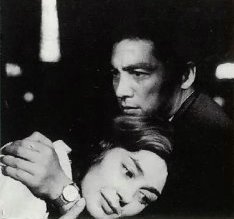Saturday, August 06, 2005
Hiroshima - Sixty Years Later
First, letters to the editor in The San Francisco Chronicle, Aug.6, 2005.
"Hiroshima troubling even 60 years later
Editor -- Sixty years ago, our country dropped atomic bombs on two Japanese cities, killing hundreds of thousands of innocent civilians. We remain the only country that has ever used such weapons on humans.
Now we have the world's largest stockpile of nuclear bombs. We are building more, weaponizing space, spending more on our military than the rest of the world combined and using "depleted" uranium munitions that poison the environment -- and humans -- for millennia.
We invaded Iraq based on fixed intelligence (confirmed by the Downing Street memo of 2002). This illegal war has already killed more than 1,800 Americans and wounded tens of thousands, not to mention Iraqi casualties. It has increased terrorism and disgraced our country.
There were no weapons of mass destruction in Iraq, but we have thousands of such weapons. Let us stop this carnage now. Bring our troops home. Impeach the liars who brought on this nightmare. Observe international treaties. Dismantle our nukes.
MADGE STRONG
Willits (Mendocino County)
-- -- --
Editor -- Charles Burress understands that it is time to let the people of Japan speak for themselves ("Wrestling with ghosts of war," Aug. 3). Rather than interpret today's Japan through "conservatives tired of apologies" or by opinion polls indicating mutual Chinese-Japanese disdain, Japan should be judged by the actions of its people.
Japan expert John Nathan in his 2004 book, "Japan Unbound: A Nation's Volatile Quest for Pride and Purpose," cites a newspaper poll indicating that amending Article 9 was not the most pressing concern among Japanese for possible revisions to the 1947 "Peace Constitution." (The article renounces war and prohibits a rebuilt military force.) Rather, the majority wanted an amendment to allow citizens to vote directly for prime minister in a national election.
A political head voted into office by the direct will of the people would have the potential to buck the power of the engrained bureaucracy and allow Japan to exhibit a new patriotism, proud of its accomplishments, aware of past mistakes, finding strength within Asia's oldest democracy.
Any revisions to Article 9 would be seen as the right of a sovereign nation to take steps considered necessary for self-protection. Japan run by the will of the people: This idea has come of age and must be one China truly fears.
RICHARD LAMBERT
Sonoma
-- -- --
Editor -- Sixty years ago, America dropped an atomic bomb on Hiroshima. This is a time for reflection.
You recently ran commentary about whether it was right to drop the bomb. Those who believe it was right have various reasons, but it comes down to one thing: The ends justify the means. This did lead to the Japanese surrender.
It is not morally right to bomb cities made up of mostly women and children. Would we do the same under similar conditions? Would it be right for other nations to use nuclear weapons if threatened?
The ends justify the means: This is a morality used by nations and empires throughout history. If we go further down this path, we will truly be lost.
RON WOLTER
Berkeley
-- -- --
Editor -- Your commentary on the bombing of Hiroshima and Nagasaki (Insight section, July 31) made the point that Japan, a resource-poor, largely defeated island nation, was on the verge of surrender prior to our dropping atom bombs on two of its cities.
Once again, however, a key question was not addressed: If it actually was necessary to quickly demonstrate our new powerful weapon (as a message to the Soviet Union as well as to Japan), why did we not drop the bomb on the most sparsely populated outer island of Japan? No one would have missed the huge mushroom cloud and subsequent devastation.
CHARLENE SPRETNAK
Half Moon Bay"The birth of 'mere terror' - The Guardian,UK
Children of Hiroshima - The Guardian,UK
The mushroom clouds over Hiroshima and Nagasaki threw a terrible shadow over the 20th century. David Smith went to Japan to meet the survivors of the bright and horrifying dawn of the atomic age.
"Black rain falling"
Surviving Hiroshima: Keiko Ogura - BBC
Hiroshima Mon Amour

Emanuelle Riva and Eiji Okada

Then there is Alain Resnais' 1959 film "Hiroshima Mon Amour". Based on Marguerite Duras' short novel, the story is about a French actress working in Japan and a Japanese architect with whom she has an affair. Their conversations, mostly about the bombing of Hiroshima and his memories of the horrible experiences were recreated in stark black white in Resnais' film.

